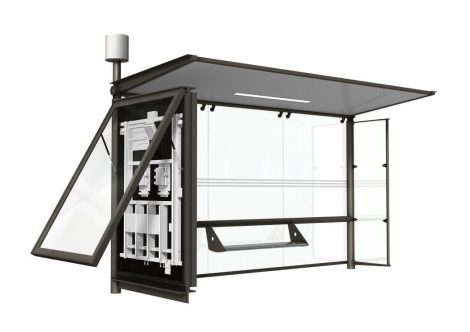Russ Curry, Ministry of New Media
JCDecaux S.A. (Euronext Paris: DEC), the number one outdoor advertising company worldwide, has announced that following the publication by the ANFR (National Frequency Agency) report in December 2018, demonstrating the relevance of the small cells installed on JCDecaux street furniture, that the Group will provide support for French telecoms operators to roll out small cells in around ten French cities in 2019.

Jean-Charles Decaux, Chairman of the Executive Board and Co-Chief Executive Officer of JCDecaux, said: “We are delighted to announce today that we are accelerating the roll-out of small cells on our street furniture in France, after several years of promoting their benefits and developing them in France and abroad. Through this initiative, JCDecaux, as a long-standing partner of city authorities, is showing that its advertising displays provide an excellent way of meeting the public’s connectivity needs. The awards received by JCDecaux at the Small Cell Forum in recent years (“Small Cell Technology and Deployment Enablers” in 2015, “Excellence in Commercial Deployment” in the urban small cell deployment category in 2017) are testament to our pre-eminence in this area and underline the expertise of our teams in providing an effective global solution that is respectful of the urban environment. JCDecaux is dedicated to help create cities that are increasingly open, accessible and attractive, and we believe that the deployment of a very advanced infrastructure is a pre-requisite to creating a smart city. This could well be the source of new products and services that benefit everyone and which create value, growth and jobs.”
As connectivity is now accepted as essential to the development of smart cities, JCDecaux is committed to enabling the advance of this technology in France by installing small cells (boxes that boost network coverage in their vicinity) on its street furniture. The aim is to enable telecoms operators to improve the coverage and performance of their mobile networks for both voice and data traffic in the highly populated urban centres, greatly benefiting cities and their inhabitants.
The deployment of a high-quality network has become a major strategic advantage to cities looking to enhance their appeal and competitiveness. Thanks to an extensive and unrivalled network in France, and its unique international expertise JCDecaux offers aesthetically pleasing, integrated solutions that respect its advertising concession agreements, local urban environmental policies and levels of exposure to radio waves. This scalable technology platform is able to meet today’s connectivity needs and facilitate the services of the future:
– The density required for the 3G and 4G mobile networks;
– The availability of an efficient Wi-Fi network;
– The expansion of low bandwidth networks required for the development of the Internet of Things (IoT) and related services.
The solutions offered by JCDecaux have been in place since 2014, with the installation of 200 small cells on bus shelters in Amsterdam for Vodafone, and make it possible to install up to 4 small cells on each item of street furniture with a limited visual impact, offering cities multi-operator deployment solutions that enable the perfect integration of these technologies in the urban environment. In 2015, the Group created JCDecaux Link, a division dedicated to developing connectivity, which now operates in 10 countries (Germany, Brazil, Chile, Spain, France, Italy, Mongolia, Panama, the Netherlands and the USA), working for major groups such as Vodafone, Verizon, Orange, Telefónica and América Móvil.
The pilot projects that the Group has been running with mobile operators in France since 2016 provided an opportunity for the ANFR to evaluate the impact of these solutions on network quality and radio wave exposure on the local population. The conclusions of the ANFR report, which was published in December 2018, confirmed that small cells could triple download speeds and gave a positive opinion of the public’s exposure to radio waves, particularly due to their shorter distance to users and the reduction in smartphone power by between two and five times, which limits the exposure to radio waves at the same time as increasing battery life.

Follow DailyDOOH